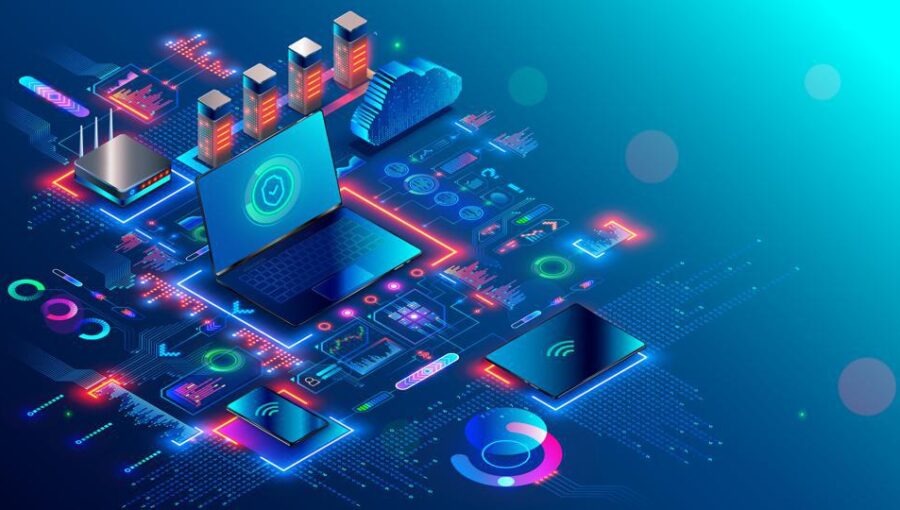In 2024, a VPN acts as a protective shield for your online activities, safeguarding you from the ever-changing landscape of cyber threats. The question lingers: is investing in a VPN truly worthwhile? As technology progresses and our dependence on the internet deepens, the demand for increased privacy and security has never been more crucial.
In this era marked by constant connectivity and frequent data breaches, the relevance of VPNs remains a topic of discussion. So, what exactly does a VPN offer in 2024? Let’s delve into the current state of online security, the advantages of using a VPN, and the emerging trends that could shape our digital experiences.
Current State of Online Security
Online security is an ever-changing field that requires continuous attention and proactive steps to safeguard your personal information. As technology progresses, hackers and malicious actors also advance their tactics to exploit vulnerabilities. Staying informed about the current state of online security is crucial to protect your digital identity.
In today’s digital landscape, the dangers to online security are numerous. Cybercriminals are constantly on the lookout for weaknesses to manipulate, using tactics that are increasingly sophisticated. From phishing attempts and malware infections to data breaches and identity theft, the risks are constant. Basic security measures are no longer sufficient; a proactive approach is essential to defend your personal data.
To counter these evolving threats, it’s vital to implement strong security practices. Using a reputable virtual private network (VPN) is a key measure. Even a free online VPN encrypts your internet connection, making it challenging for hackers to intercept your data. It also ensures anonymity by concealing your IP address, protecting the privacy and security of your online activities.
Alongside utilizing a VPN, it’s critical to keep your software and devices up to date, create strong, unique passwords, and exercise caution when sharing personal information online. By staying informed and taking proactive measures to safeguard your digital privacy, you can navigate the online world confidently and maintain control over your personal information.
Evolving Threats to Digital Privacy
Moving into 2024, the increasing risks to digital privacy are a growing concern.
The rapid advancements in technology and the expanding digital landscape have introduced new challenges to safeguarding our personal information online.
Cybercriminals are becoming more sophisticated, leading to a rise in data breaches. Stronger security measures are necessary to protect our privacy in this evolving digital environment.
Privacy Risks in 2024
As digital privacy threats continue to evolve, it’s important to be aware of the privacy risks individuals may encounter in 2024. Here are key concerns to keep in mind:
- Data breaches: Cybercriminals will persist in targeting personal information like financial details, emails, and social media accounts, putting your privacy in jeopardy.
- Surveillance: Both governments and corporations might enhance their surveillance capabilities, monitoring your online actions and gathering data without your explicit consent.
- Identity theft: With advancing technology, malicious actors are finding new ways to steal identities, potentially resulting in financial harm and harm to one’s reputation.
- Location tracking: Companies could track your physical location through your devices, compromising your privacy and potentially subjecting you to targeted ads and unwelcome intrusions.
To safeguard your freedom and privacy in 2024, it’s crucial to stay informed about these risks and take proactive measures to protect your digital presence.
Need for Enhanced Security
In today’s digital world, safeguarding your online privacy is more crucial than ever. With cyber threats constantly evolving, it’s vital to take steps to enhance your security.
Hackers and cybercriminals are becoming increasingly sophisticated, making it easier for them to access your sensitive information. One effective way to protect yourself is by using a trustworthy VPN (Virtual Private Network).
A VPN encrypts your internet traffic and hides your IP address, making it extremely difficult for anyone to monitor your online activities or steal your personal data. By incorporating enhanced security measures like a VPN, you can ensure the safety of your digital privacy and browse the internet with peace of mind, knowing you’re protected from evolving threats.
Benefits of Using a VPN
Using a VPN offers several advantages.
Firstly, it enhances your online privacy by encrypting your internet traffic and masking your IP address. This means that your online activities are protected from prying eyes.
Secondly, a VPN allows you to bypass geo-restrictions, giving you access to content and websites that may be blocked in your area.
Lastly, a VPN provides a secure connection to public Wi-Fi networks, keeping your sensitive information safe from potential hackers.
Privacy Protection Online
Enhancing your online privacy with a VPN involves encrypting your internet connection and concealing your IP address.
The advantages of using a VPN for privacy protection online include:
- Secure Data Transmission: A VPN establishes a secure tunnel for your online activities, preventing unauthorized access to your sensitive information.
- Anonymous Browsing: By masking your IP address, a VPN ensures that your online actions remain untraceable to you.
- Protection from Hackers: VPNs provide an additional layer of security, making it challenging for hackers to breach your personal data or financial details.
- Prevention of Data Tracking: With a VPN, your internet service provider and other third parties are unable to monitor your online behavior, safeguarding your privacy.
Bypassing Geo-Restrictions
When you use a VPN to bypass geo-restrictions, you can access content and websites that might be blocked in your current location. This means you can watch your favorite TV shows while traveling or visit websites that are unavailable in your country.
A VPN allows you to connect to servers in different countries, making it seem like you’re browsing from that specific location. By doing this, you can get around the restrictions imposed by websites or online services based on where you are.
The VPN encrypts your internet traffic and routes it through a different server, ensuring your online activities stay private and secure. This way, you have the freedom to access the content you want without limitations.
Secure Public Wi-Fi Connections
Using a VPN offers a secure way to connect to public Wi-Fi networks. Here are the advantages you can enjoy:
- Enhanced Security: A VPN encrypts your internet traffic, safeguarding your sensitive information from potential hackers and eavesdroppers.
- Privacy Protection: By concealing your IP address, a VPN ensures that your online activities remain anonymous, protecting your personal data from tracking or monitoring.
- Data Integrity: VPNs create a secure tunnel for your data to travel through, preventing tampering and ensuring its integrity.
- Freedom to Access: By bypassing restrictions and censorship, a VPN allows you to access blocked websites and services, giving you unrestricted internet access wherever you are.
VPN Encryption and Data Protection
Encryption and data protection play a vital role in a VPN, safeguarding the confidentiality and security of your online actions. When you connect to a VPN server, your data undergoes encryption, making it indecipherable to any potential eavesdroppers. This encryption shields your sensitive data, such as passwords, financial information, and personal communications, from unauthorized access by cybercriminals or surveillance entities.
A VPN utilizes robust encryption standards like AES-256, which is highly secure and resistant to decryption attempts. By employing secure tunneling protocols like OpenVPN or IKEv2, VPNs create a protected pathway, or ‘tunnel,’ for your data as it travels between your device and the VPN server, adding an extra layer of security.
Furthermore, VPNs safeguard your privacy by concealing your IP address and physical location. This prevents websites, advertisers, and even your internet service provider from monitoring your online behavior. With a VPN, you have the power to manage your online identity and browse the internet confidently, knowing that your data is encrypted and your privacy is maintained.
Accessing Geo-Restricted Content
Accessing geo-restricted content is made easy with a VPN. When you connect to a VPN server in a different country, you can bypass restrictions set by content providers and access the content you want. Here’s why using a VPN is valuable for accessing geo-restricted content:
- Bypassing regional restrictions: A VPN lets you change your virtual location, making it seem like you’re browsing from another country. This helps you bypass regional restrictions and access content that may be unavailable in your current location.
- Unlocking streaming services: With a VPN, you can access popular streaming platforms like Netflix, Hulu, and BBC iPlayer from anywhere. By connecting to a server in the country where the content is accessible, you can enjoy a wide variety of movies, TV shows, and live sports events.
- Accessing restricted websites: Certain countries block access to specific websites or social media platforms. By using a VPN, you can get around these restrictions and visit the blocked sites, allowing you to browse the internet freely without any limitations.
- Enhancing privacy: A VPN encrypts your internet traffic, ensuring that your online activities are private and secure. This is especially crucial when accessing geo-restricted content as it protects your data from potential surveillance or monitoring by third parties.
VPNs and Public Wi-Fi Security
Using a VPN boosts the security of public Wi-Fi networks. When you connect to public Wi-Fi, like in cafes, airports, or hotels, your data can be at risk from hackers. Public Wi-Fi is often unsecured, allowing anyone on the network to intercept your data. This is where a VPN helps.
A VPN, or Virtual Private Network, creates a secure and encrypted connection between your device and the internet. By using a VPN on public Wi-Fi, all your data gets encrypted and sent through a secure server. This makes it extremely difficult for others on the network to access or understand your data. Even if someone breaches the network, they won’t get to your sensitive information.
VPNs for Remote Work and Travel
VPNs play a crucial role in remote work and travel by ensuring secure connections and safeguarding your data. Here are reasons why using a VPN is beneficial for your remote work and travel requirements:
- Secure Remote Access: VPNs enable you to securely connect to your company’s network from any location. By encrypting your internet traffic, they protect your sensitive work information from unauthorized access.
- Bypass Geographical Restrictions: With a VPN, you can access websites and online services that might be restricted in your current location. Whether you’re on a work trip or vacation, a VPN allows you to enjoy unrestricted internet access and maintain your productivity.
- Protect Personal Information: Public Wi-Fi networks in hotels, airports, or cafes can expose your personal data to hackers. A VPN encrypts your data, ensuring it remains safe from potential threats while you’re connected to these networks.
- Anonymous Browsing: VPNs help maintain your privacy by masking your IP address and location. This prevents websites and online services from tracking your online activities, giving you the freedom to browse without limitations.
VPNs and Online Gaming
Online gaming has seen a boost in security and seamless play thanks to VPNs. As online gaming gains more popularity, safeguarding personal information and privacy while gaming has become essential. VPN, short for Virtual Private Network, creates a secure internet connection by encrypting data and routing it through a distant server. This not only shields sensitive information from potential cyber threats but also stops your internet service provider (ISP) from slowing down your connection or monitoring your online actions.
By using a VPN for online gaming, you can bypass geographical restrictions and access games or servers not typically available in your area. This flexibility allows you to play with friends worldwide and engage in various gaming communities. Furthermore, a VPN can lessen latency and boost gaming performance by providing a direct and optimized link to the game server.
Nevertheless, it’s worth noting that using a VPN might slightly increase latency due to the additional encryption and routing process. Hence, it’s advisable to select a VPN service that offers fast and steady servers specially optimized for gaming.
Future Trends in VPN Technology
The future of VPN technology is set to bring about exciting advancements and innovations. As technology progresses, VPNs are expected to adapt to the changing landscape. Here are some upcoming trends in VPN technology to anticipate:
- Faster Speed and Enhanced Performance: VPN providers are actively improving their networks to offer faster speeds and better overall performance. Through advancements in encryption algorithms and hardware, VPNs will become more efficient in handling data transfer.
- Advanced Security Measures: VPNs will continue to prioritize security and privacy. Expect to see advanced encryption protocols, multi-factor authentication, and enhanced malware protection. These features will ensure the privacy and security of your online activities.
- Wider Server Network: VPN providers will expand their server networks, providing more diverse locations for connections. This expansion will enable better access to geo-restricted content and improved connection stability.
- Integration with Smart Devices: With the rise of smart devices, VPNs will seamlessly integrate with them. You’ll be able to safeguard your privacy and secure your data on smartphones, tablets, smart TVs, and even smart home devices.
These future trends in VPN technology promise to offer more freedom, security, and convenience in your online experiences. Stay tuned for these exciting advancements in the world of VPNs.



